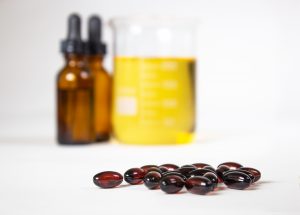
(Editor’s note: This story is part of a recurring series of commentaries from professionals connected to the cannabis industry and first appeared at Marijuana Business Daily. Raquel Origel is the founder and CEO of Inanna Manufacturing, a cannabis labeling and packaging company based in California.)
In every hemp product’s journey to market, business owners will need to decide whether to build a manufacturing operation from scratch or seek support from a partner.

Raquel Origel
This is where white-label services come in.
In the cannabis industry, a white-label manufacturer manages the production of marijuana and hemp products for companies that don’t have their own manufacturing facilities, providing a way for brands to get their products onto the shelves of licensed retailers faster and in a cost-effective way.
The choice of whether to partner with a manufacturer will come down to two core questions:
- How will this partnership impact the quality of my product?
- How will it impact my bottom line?
Use the information in this story as a framework to help find the answers.
The benefits of white-label manufacturing
White-label manufacturing is about efficiency.
Establishing facilities, securing proper licensing and designing proof of concept from scratch can take more than a year of concentrated work and hundreds of thousands – if not a million or more – dollars, delaying your entry into the market and making you more vulnerable to competitors.
A white-label manufacturer solves that problem with equipment and operations that are already up and running and also offers the ability to scale quickly as your business grows.
Manufacturing partners also help manage quality control and compliance, which are notoriously complicated for cannabis products.
Mistakes and oversights in this area can cause huge problems, sometimes requiring a total retool.
White-label manufacturers manage these responsibilities from the outset, taking the pressure off brands and helping to ensure that a product goes to market on time and in compliance.
White-label partners also open the door to a wealth of institutional resources, including scientists, chefs, operations professionals and other services in the supply chain, ensuring you have trusted support across the full journey to market.
Some partners can even go further by directly extending their licenses. This allows brands to skip the complicated and time-consuming process of applying for their own licenses and get straight to manufacturing their products.
Finally, one of the most important benefits of a white-label manufacturer is the price point, compared with doing the work from scratch.
This partnership automatically cuts out the cost of equipment, compliance, rent, overhead, staffing and more, and it can offer wholesale discounts on materials.
Some manufacturers can also hold brands that don’t have a cannabis license as a financial interest holder, meaning they can manage your accounting, taxes and bookkeeping as well.
These services make a significant difference for your bottom line.
An initial run with a white-label manufacturer will generally cost $10,000-$25,000.
Between build-out costs and licensing fees, companies going it alone will spend $500,000-$1 million.
When to pass
A white-label manufacturer saves brands the time and money of building an operation from the ground up. So the No. 1 reason to opt out is if your company has already built operations on its own.
For some companies, being vertically integrated and entirely self-sufficient is a point of pride. If this is important to your brand values or a linchpin of your marketing strategy, it might be best to go it alone.
The other major reason to skip white-label manufacturing is if you can’t find a trustworthy partner.
This partner will handle the day-to-day operations and quality control in manufacturing your product, so communication and professionalism are essential.
Sharing the reins can be hugely beneficial when done correctly, but it can be deeply problematic if the partner can’t be trusted.
Fortunately, there are a growing number of proven and trustworthy manufacturers in the industry who have worked with some of the biggest names and most innovative products.
When vetting potential partners, ask as many questions as you can:
- Have they worked with your type of product before?
- What is their price breakdown?
- How do they communicate with clients, and how often?
- What is their production schedule and average timeline for execution?
- What licenses and certificates can they offer?
- How are they different from their competitors?
These questions and more will help determine if a manufacturer is a good fit and trustworthy choice.
After the partnership is formalized, develop an approach for touching base with the partner and holding them accountable to the agreement.
Some brands are hesitant to opt for white-label manufacturing because they worry about the security of their recipes and other information that sets them apart in the market.
This concern is understandable, especially in an industry that still has aspects of the Wild West.
However, it’s not a reason to rule out white-label manufacturing altogether.
Instead, this is yet another argument for thoroughly and properly vetting partners. A reputable white-label manufacturer will have high standards for security and confidentiality and will be enthusiastic to earn your trust.
At the end of the day, the question is not only about whether to use a white-label manufacturing service but also about finding the right partner, if that is your choice.
The industry still has work to do to establish trust within itself, including building bridges between established businesses and newcomer entrepreneurs.
But the success of white-label manufacturing shows that when we combine our efforts and share our expertise, we make the whole industry better.
Raquel Origel leads the team of Inanna Manufacturing, offering white-label and copacking services to cannabis brands throughout California. She can be reached at [email protected].
To be considered for publication as a guest columnist, please submit your request to [email protected] with the subject line “Guest Column.”

